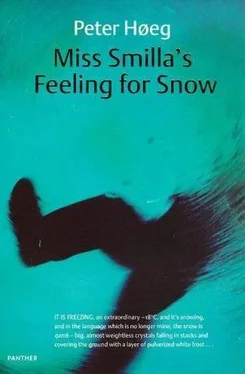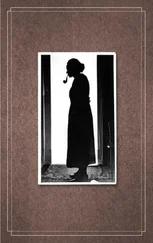Peter Høeg - Smilla's Sense of Snow aka Miss Smilla's Feeling for Snow
Здесь есть возможность читать онлайн «Peter Høeg - Smilla's Sense of Snow aka Miss Smilla's Feeling for Snow» весь текст электронной книги совершенно бесплатно (целиком полную версию без сокращений). В некоторых случаях можно слушать аудио, скачать через торрент в формате fb2 и присутствует краткое содержание. Жанр: Современная проза, на английском языке. Описание произведения, (предисловие) а так же отзывы посетителей доступны на портале библиотеки ЛибКат.
- Название:Smilla's Sense of Snow aka Miss Smilla's Feeling for Snow
- Автор:
- Жанр:
- Год:неизвестен
- ISBN:нет данных
- Рейтинг книги:3 / 5. Голосов: 1
-
Избранное:Добавить в избранное
- Отзывы:
-
Ваша оценка:
- 60
- 1
- 2
- 3
- 4
- 5
Smilla's Sense of Snow aka Miss Smilla's Feeling for Snow: краткое содержание, описание и аннотация
Предлагаем к чтению аннотацию, описание, краткое содержание или предисловие (зависит от того, что написал сам автор книги «Smilla's Sense of Snow aka Miss Smilla's Feeling for Snow»). Если вы не нашли необходимую информацию о книге — напишите в комментариях, мы постараемся отыскать её.
Smilla's Sense of Snow aka Miss Smilla's Feeling for Snow — читать онлайн бесплатно полную книгу (весь текст) целиком
Ниже представлен текст книги, разбитый по страницам. Система сохранения места последней прочитанной страницы, позволяет с удобством читать онлайн бесплатно книгу «Smilla's Sense of Snow aka Miss Smilla's Feeling for Snow», без необходимости каждый раз заново искать на чём Вы остановились. Поставьте закладку, и сможете в любой момент перейти на страницу, на которой закончили чтение.
Интервал:
Закладка:
I take a look around. But he seems to be alone.
"The first requirement is loyalty. You also have to have a high score on your exams. And a desire to achieve which is far beyond the ordinary. But in the long run, the important thing is whether you are loyal. Common sense is not a prerequisite, on the other hand. Might even be a drawback."
I sit down on a chair. The mechanic leans against the desk.
"At some point we had to choose. Some became deputy judges and, eventually, judges. They often had a natural faith in justice, in the system. Faith in the possibility of healing and rebuilding. The rest of us became assistant detectives, investigators, and later assistants to the district attorney. With time, maybe assistant prosecutors. We were the suspicious ones. We believed that a statement, a confession, an incident was seldom what it purported to be. This suspiciousness was an excellent tool for us. As long as it wasn't directed at our work or at the Ministry itself. A bureaucrat in the prosecutor's office must never doubt that he is right. Any impertinent question from the press must be referred to higher-ups. Any article you publish with even a hint of criticism-well, virtually any article at all-will be interpreted as disloyalty toward the Ministry. In some ways you no longer exist as an individual in the Ministry of Justice. Most comply with this demand. I can tell you that most people secretly find it a relief to have the state divest them of the trouble of being an independent person. The few who can't comply are separated out at an early stage."
I've seen it on long journeys. When someone is burned out, he suddenly discovers within himself a landscape of cheerful cynicism.
"And yet once in a while a slippery character happens to stay in the system. Someone who can hide his true nature until it's too late. Until he's made himself relatively indispensable, so it would be difficult for the Ministry to do without him. This type of person will never reach the top. But he can get partway up. Maybe even as far as the position of investigator for the district attorney. By that time he would be too old-and maybe even too expert in his field-to be dispensable. But he has made too much trouble to be promoted upward. This kind of person would be a pebble in the Ministry's shoe. It doesn't really hurt, but it's annoying. With time, they would try to put this kind of person into a niche. Where they could draw on his stubbornness and memory, but where they could keep him out of the public eye. Maybe he would end up taking on special assignments. Like intelligence work, where staying out of the spotlight is part of the job. A complaint about the investigation of a little boy's death might even end up in his lap. If it turned out that there was already a report on file about the case." He doesn't look at either of us.
"It so happens that word comes from higher up that the person who filed the complaint must be reassured. `Pacified,' as they say at the Ministry at Slotsholm. They have a good deal of experience in this. But this time the case is more difficult. A child's death. Photographs of his footprints on the roof. It could easily turn into an embarrassment. So I voice the idea that there's some irregularity in the boy's death. But I don't get any backup, from either the police or the Ministry."
He gets up from the chair with difficulty.
"Then that deplorable fire occurs. Unfortunately, it too has something to do with Greenland. And the name of the gentleman who perishes is listed in the aforementioned report. Yesterday morning I was taken off the case. `Due to its complex nature,' etc."
He straightens his hat and walks over to the desk. He taps lightly on the red tape on the phone.
"Very clever," he says. "There's no end to the trouble these apparatuses cause innocent citizens. But it would have been even better not to answer the phone at all, or not to give out your number. The ship was almost totally destroyed by the fire, but the telephone must have been made of a non-flammable material. And it was lying on the floor, too. It had a built-in memory that stored the last number called. The last number was yours. My guess is that you will soon be invited in for a little talk."
"Wasn't it risky for you to come here?" I ask.
He has a key in his hand. "We borrowed a key from the custodian during the initial investigation. I took the liberty of making a copy. So I went through the basement rooms. I'm planning to go back out the same way."
For a fleeting moment something happens to him. A light goes on in his face, as if a pinch of humor and humanity flares up behind the lava. The fossilized memory of the pumice stone, of the time when everything was hot and flowing. It's this light that makes me ask the question.
"Who is Tørk Hviid?"
The light goes out, his face becomes expressionless, as if his soul had left his body.
"Is that someone's name?"
I pick up his coat and help him into it. He's a little shorter than me. I brush off a speck of dust from his shoulder. He looks at me.
"My home number is in the book. Think about calling me, Miss Smilla. But from a phone booth, if you wouldn't mind."
"Thanks," I say.
But he's already gone.
The chimes of Our Saviour's Church are ringing. I look at the mechanic. I have my hands behind my back. The room is full of what Ravn brought with him and left behind: candor, bitterness, insinuations, some kind of human warmth. And something else.
"He was lying," I say. "He lied at the end. He knows who Tørk Hviid is."
We look into each other's eyes. Something is wrong.
"I hate lies," I say. "If any lying has to be done, I'll do it myself."
"Then you should have told him that. Instead of coming right out and hugging him."
I can't believe my ears, but I see that I've heard correctly. In his eyes there is the gleam of pure, unadulterated, idiotic jealousy.
"I didn't hug him," I say. "I helped him into his coat. For three reasons. First, because it's a courtesy you ought to show toward a fragile, elderly man. Second, because he presumably risked his position and pension to come here."
"And the third?"
"Third," I say, "because it gave me the chance to steal his wallet."
I put it on the table, under the light, where Isaiah's cigar box once stood, a wallet made of heavy brown leather.
The mechanic stares at me.
"Petty theft," I say. "Considered a minor offense under the law."
I empty its contents onto the table. Credit cards, krone notes. A plastic case with a white card which states, under a black embossed crown, that Ravn has the right to park in the Ministry's parking lots at Slotsholm. A bill from Andersen Brothers tailor shop. To the tune of 8,000 kroner. A small fabric sample of gray wool attached to the bill with a paper clip. "Man's overcoat, Lewis tweed, delivered October 27, 1993." Until now I thought his coats were a mistake. Something he had bought used. Now I see that they're intended to be that way. On the income of an ordinary bureaucrat he spends a fortune for the fragile illusion of an extra foot and a half across his shoulders. For some reason this puts him in a conciliatory light.
There's a pouch for coins. I shake them out. Among them-I find a tooth. The mechanic bends over me. I lean back against him and close my eyes.
"A baby tooth," he says.
In the back there is a bundle of photographs. I lay them out like playing cards in a game of solitaire. On a mahogany buffet there is a samovar. Next to the buffet a shelf full of books. The word "cultivated" is one of those Danish words that I've never been able to regard as anything but a linguistic truncheon to hit people over the head with. But maybe it could be used to describe the woman in the foreground. She has white hair, rimless glasses, a white wool suit. She must be in her mid-sixties. In the other photos she sits surrounded by children. Grandchildren. That explains the baby tooth. She pushes a child on a swing, cuts a cake at a table out in the yard, takes a baby being handed to her by a younger woman who has her jaw but Ravn's gauntness.
Читать дальшеИнтервал:
Закладка:
Похожие книги на «Smilla's Sense of Snow aka Miss Smilla's Feeling for Snow»
Представляем Вашему вниманию похожие книги на «Smilla's Sense of Snow aka Miss Smilla's Feeling for Snow» списком для выбора. Мы отобрали схожую по названию и смыслу литературу в надежде предоставить читателям больше вариантов отыскать новые, интересные, ещё непрочитанные произведения.
Обсуждение, отзывы о книге «Smilla's Sense of Snow aka Miss Smilla's Feeling for Snow» и просто собственные мнения читателей. Оставьте ваши комментарии, напишите, что Вы думаете о произведении, его смысле или главных героях. Укажите что конкретно понравилось, а что нет, и почему Вы так считаете.




![Рута Шепетис - Ashes in the Snow [aka Between Shades of Gray]](/books/414915/ruta-shepetis-ashes-in-the-snow-aka-between-shades-thumb.webp)







